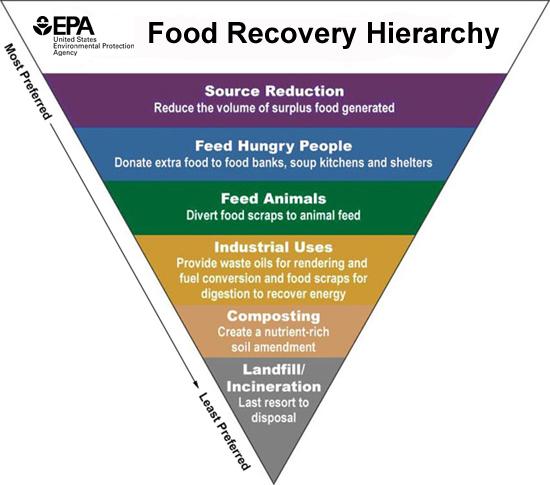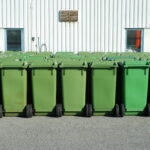The RecyclingWorks in Massachusetts program has worked with state and local health officials, food rescue organizations, food banks, and organizations with established food donation programs to develop this Food Donation guidance document by holding three stakeholder meetings across the state in Springfield (March 25, 2015), Worcester (April 9, 2015) and Boston (April 29, 2015). The information gained from the meetings was used to create this guidance document.
The US EPA’s Food Recovery Hierarchy ranks feeding hungry people near the top of its priorities as a strategy to reduce wasted food. Businesses should consider how each strategy on the EPA Hierarchy can contribute to a comprehensive food waste reduction plan.
This document is intended to provide guidance to organizations interested in establishing Food Donation programs by offering a broad overview of how successful food donation programs should be structured. In order to have a successful food donation program there are four major steps that must be taken:
- Identify the types and amounts of food to be donated
- Identify partner organizations in your area with which to work
- Determine packaging, storage, and labeling requirements to ensure food safety
- Determine how food will be transported as well as pick-up frequency and quantities

Why should my business donate surplus food?
Every day, Massachusetts businesses throw away thousands of pounds of food. Much of this food could instead feed hungry people, while at the same time reduce waste disposal costs and provide tax benefits for businesses donating food. The Harvard Food Law and Policy Clinic prepared a fact sheet regarding tax incentives for food donation. Diverting food for donation is only one way to reduce food waste.
What foods can be donated?
Most categories of food can be donated. The law provides protection from liability for the donation of food that is ‘apparently wholesome’ without visible quality issues. When donating food, it is important to remember that the donation is for human consumption and needs to be handled accordingly. If food looks or smells bad – compost it! All donated food should be protected to prevent food contamination by storage in packages, covered containers, or wrappings. For more information see the chart below, which summarizes storage requirements and unacceptable conditions for donated food by category. For more comprehensive information see pages 37-38 of the Comprehensive Guidelines for Food Recovery Programs. If you have any questions about food safety contact your local board of health.
Food Donation Laws and Liability Protection
Extensive legal research does not turn up a single legal case related to food donation liability. There are several laws pertaining to food donation at the federal and state level. The Bill Emerson Good Samaritan Food Donation Act (42 U.S.C. § 1791) encourages food donations by providing liability protections for businesses that donate ‘apparently wholesome’ food in ‘good faith’ to nonprofit organizations. 42 U.S.C. § 1758(l) explicitly states that schools participating in the national lunch program that donate excess food receive liability protection under the Bill Emerson Good Samaritan Food Donation Act.
In January of 2023, the Food Donation Improvement Act (FDIA) was signed into federal law. The FDIA works to further combat food insecurity and wasted food by extending the Emerson Act’s protections to donations that are offered to recipients at a reduced price. The FDIA also protects certain donations by food businesses that are given directly to individuals experiencing food insecurity. This will improve the efficiency of directing food to people, optimize the freshness of donated food, and reduce the costs involved. In light of the FDIA, the Harvard Food Law and Policy Clinic updated its fact sheet on the federal liability protections for food donation (also available in Spanish). This fact sheet clearly outlines the protections in place and who they apply to.
Massachusetts provides additional protections for food donations under Mass. Gen. Laws ch. 94 § 328. The Massachusetts law provides protections for donated food, even food that is past date, so long as that food was handled in accordance with state food safety regulations. For more information about Liability Protection see the Harvard Food Law and Policy Clinic fact sheet.
Food Labeling 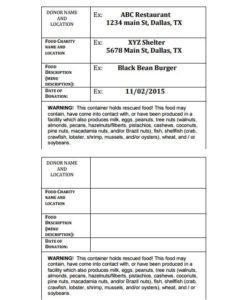
Foods must comply with state and federal labeling requirements in order to be donated. This means that all foods must have labels with allergen warnings. In accordance with Massachusetts law, perishable and semi-perishable foods must also bear a date label, and food sold or donated past that date label must be safe for human consumption, segregated from other foods, and clearly marked as being past date. For foods that may contain allergens, a warning label should be put on the package stating that the food may contain allergens and that people who may have an allergic reaction should not consume it. The 2016 revision of the Comprehensive Guidance for Food Recovery Programs provides a template for donated food labeling on Page 49 which includes a generic allergen warning. Contact your local board of health for guidance on how food should be labeled. The Harvard Food Law and Policy Clinic has prepared a document specifically about food date labeling in Massachusetts.
Building a Donation Program
Food donations are an important strategy for feeding vulnerable populations in need and providing access to safe, healthy food. When setting up a food donation program it is important to establish procedures that protect the safety of donated foods. For prepared foods, temperature logs should be kept showing that proper temperature has been maintained. Write down standard operating procedures (SOPs) on how you will handle food for donation, where you will store it, and what types of food you will be donating. Make sure to train all staff about your food donation program – hold staff meetings, create signage and create checklists. Share your SOPs with the organizations you partner with so everyone involved is on the same page.
Finding Partner Food Rescue Organizations
There are many organizations in Massachusetts that accept and distribute food for donation. It is important to build a network of partners that can accept your surplus food. Seek out the organizations in your area that distribute food to those in need. You can use the RecyclingWorks Find-a-Recycler tool to find nearby organizations that accept surplus food for donation. Additionally, the Food Rescue Locator is a national resource for locating food rescue organizations, built and maintained by Sustainable America, with support and guidance from the Food Rescue Alliance, Environmental Protection Agency and the Harvard Law School Food Law and Policy Clinic. If you are having trouble locating organizations in your area, speak with other local businesses that have food donation programs.
Contact the RecyclingWorks in Massachusetts Hotline at 1-888-254-5525, or email us at info@recyclingworksma.com. Remember that in order to receive liability protections, the food must be donated to 501(c)(3) not-for-profit organizations. The resources section of this web page lists some of the many food donation organizations in Massachusetts.
Building a Relationship with Partner Food Rescue Organizations 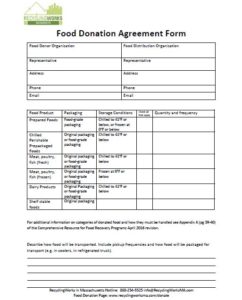
Donating food can have a positive impact on many people, from your employees to the broader community. Building relationships with your partner organizations is important to the success of your food donation programs. Frequent communication and site visits with partner organizations can foster positive relationships and build trust. To build a trust-based relationship it is important to have a written agreement with partner organizations that states what foods will be donated, how that food will be handled and stored, and how frequently that food will be transported. The image to the right is a template for an agreement between organizations. Click on the image to see a form that can be used as a template to help develop a written agreement between a donating organization and a donee organization.
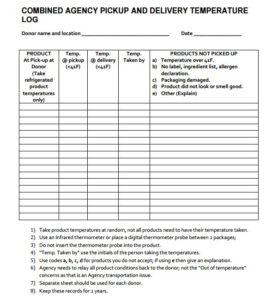 Food Transportation
Food Transportation
Different types of food have different transportation needs. Canned and shelf-stable foods have different transportation needs than temperature-controlled foods. Speak with your local health board and food rescue organizations to ensure that food is being transported appropriately. Keep transportation logs to ensure that food is arriving at the donation location in the same condition it left your facility. The form to the right is an example of a transportation log that can be used to ensure that food is transported safely and appropriately. For more information on transporting food for donation, see pages 28-30 of the Comprehensive Guidelines for Food Recovery Programs.
Resources
There are many resources and organizations available to find further information and assistance with setting up a food donation program. Below is a list of additional resources and organizations. If you have any questions about setting up Food Donation programs call RecyclingWorks at 1-888-254-5525 or email us at info@RecyclingWorksMA.com
Boards of Health
Massachusetts Health Officers Association (MHOA)
Massachusetts Environmental Health Association (MEHA)
Massachusetts Department of Public Health
Documents and Laws
Comprehensive Guidelines for Food Recovery Programs
Harvard Food Law and Policy Clinic Fact Sheet: Liability Protection
Harvard Food Law and Policy Clinic Fact Sheets: Tax Incentives
Harvard Food Law and Policy Clinic Fact Sheets: Date Labeling
2011 Massachusetts and Federal Merged Food Code
Massachusetts Partnership for Food Safety Education
Donation Organizations
Food Banks in Massachusetts
Food Bank of Western Massachusetts | Hatfield, MA | (413) 247-9738 | www.foodbankwma.org
Service Area: Serves 4 counties in western Massachusetts – Franklin, Hampshire, Hampden, and Berkshire.
Greater Boston Food Bank | Boston, MA | (617) 427-5200 | www.gbfb.org
Service Area: Serves 9 counties in eastern Massachusetts – Essex, Middlesex, Suffolk, Norfolk, Plymouth, Bristol, Barnstable, Dukes, and Nantucket.
Merrimack Valley Food Bank | Lowell, MA | (978) 454-7272 | www.mvfb.org
Service Area: Serves 25 cities and towns in southern New Hampshire and Massachusetts – within Essex and Middlesex counties.
Worcester County Food Bank | Shrewsbury, MA | (508) 842-3663 | www.foodbank.org
Service Area: Serves Worcester County.
Food Rescue Organizations Serving Massachusetts
Fair Foods | Dorchester, MA | (617) 288-6185 | www.fairfoods.org
Food for Free | Cambridge, MA | (617) 868-2900 | www.foodforfree.org
Food Link | Arlington, MA | (781) 819-4225 | www.foodlinkma.org/
Food Rescue US | Boston, MA | (857) 264-0557 | https://foodrescue.us/
Lovin’ Spoonfuls | Boston, MA | (617) 390-4450 | www.lovinspoonfulsinc.org
Rachel’s Table – Springfield | Springfield, MA | (413) 733-9165 | www.rachelstablespringfield.org
Rachel’s Table – Worcester | Worcester, MA | (508) 799-7699 | www.rachelstable.org
Rescuing Leftover Cuisine | MA and RI | (401) 965-4532 | www.rescuingleftovercuisine.org/massachusetts
For a searchable list of smaller agencies, like soup kitchens and food pantries near you, visit www.findafoodpantry.org.
Food Donation Networking Organizations
Food Donation Connection – Harvest Programs | USA | (800) 831-8161 | www.foodtodonate.com
Food Recovery Network | USA | info@foodrecoverynetwork.org | www.foodrecoverynetwork.org
Spoiler Alert | Boston, MA | 617-917-4123 | info@spoileralert.com | www.spoileralert.com
For recycling assistance, or to provide feedback about these guidelines, please contact RecyclingWorks at (888) 254-5525 or info@recyclingworksma.com.
Page last modified April 12, 2017

